In a significant move amid ongoing geopolitical tensions and U.S. sanctions, private Chinese company China Concord Resources Corp (CCRC), operating under the name Concord Resources, has committed to a $1 billion investment in Venezuela’s oil sector. This initiative aims to revitalize two underutilized oil fields, potentially boosting Venezuela’s crude production at a time when the country is seeking new partnerships to stabilize its energy industry.
Details of the Investment and Development Plan
According to recent reports, CCRC has entered into a rare 20-year production sharing contract with Venezuela’s state-owned oil giant, Petróleos de Venezuela S.A. (PDVSA). The agreement focuses on developing the Lago Cinco and Lagunillas Lago oil fields, located in the western part of the country. Currently, these fields are producing around 12,000 barrels per day (bpd) of crude oil. The ambitious plan involves reopening mothballed wells and drilling new ones—potentially up to 500 wells in total—to ramp up output to 60,000 bpd by the end of 2026.
The crude produced will be divided based on type: light crude will be supplied directly to PDVSA for domestic use or further processing, while heavy crude is earmarked for export to China. This arrangement aligns with China’s ongoing interest in securing energy resources, even as larger state-owned Chinese firms have scaled back direct involvement due to U.S. sanctions imposed in 2019.
These sanctions, which targeted Venezuela’s oil sector during the first Trump administration, have deterred major international players, opening doors for smaller, private entities like CCRC to step in.
This deal is part of a broader effort by PDVSA to attract foreign investment through production-sharing agreements, where partners manage operations and receive a share of oil sales, while PDVSA retains at least a 50% stake in output.
In June 2025, Venezuela signed nine such oil deals with various international partners, signaling a push to reverse years of declining production.
Venezuela’s Oil Sector: Current Production and Major PlayersVenezuela, once a powerhouse in global oil markets with proven reserves exceeding 300 billion barrels, has seen its production plummet from over 3 million bpd in the early 2000s to historic lows due to economic mismanagement, corruption, and international sanctions. As of mid-2025, the country’s crude oil output has stabilized around 1 million bpd, with recent figures showing fluctuations:
January 2025: 892,000 bpd
June/July 2025: Approximately 1.1 million bpd, maintained partly through imports of diluents to process heavy crude
July 2025: 1.084 million bpd
Projections suggest that without sustained foreign investment, production could dip below 800,000 bpd by late 2025, especially if key partners like Chevron face restrictions.
PDVSA remains the dominant force, but it relies heavily on joint ventures with foreign firms to operate amid equipment shortages and financial constraints.
Major oil companies active in Venezuela as of 2025 include:PDVSA:
The state-owned entity oversees all operations, with a focus on maintaining output through new partnerships.
Chevron (U.S.): Operating under a special U.S. license, Chevron produces around 200,000 bpd and has resumed exports to the U.S. This represents a significant portion of Venezuela’s output, though its license terms prohibit direct payments to the Venezuelan government.
European Firms: Companies like Repsol (Spain), Eni (Italy), and Maurel & Prom (France) are involved in joint ventures, lobbying for license extensions amid U.S. sanction uncertainties.
Chinese Entities: Beyond CCRC, state-linked China National Petroleum Corporation (CNPC) has historical ties but reduced activities post-2019. Independent Chinese refiners continue to import Venezuelan crude.
Others: Total SA (France), ONGC (India), and Belorusneft (Belarus) maintain operations in various fields.
The sector’s recovery is precarious, with output contracting in recent months due to renewed sanctions, though PDVSA’s efforts to find new partners like CCRC offer some hope.
Export Destinations: Shifting Markets Amid Sanctions
Venezuela’s oil exports averaged 727,000 bpd in July 2025, down from 807,000 bpd in June, as partners awaited U.S. authorizations.
Sanctions have forced a rerouting of trade, with traditional buyers like the U.S. partially resuming imports while Asian markets dominate.Key export destinations in 2025 include:China: A major buyer, with increasing cargoes as sanctions tighten. Independent refiners in China have filled the gap left by state firms, and heavy crude from deals like CCRC’s is directed here.
United States: Resuming in earnest, with Chevron facilitating shipments of heavy crudes like Hamaca and Boscan to U.S. refineries on the Gulf and West Coasts. U.S. imports peaked at 300,000 bpd earlier in the year, accounting for up to 37% of Venezuela’s exports in monitored periods.
India: A key alternative market, receiving crude and products like methanol and petroleum coke.
Cuba: Small but consistent shipments, around 8,000 bpd, as a political ally.
Europe: Limited volumes of refined products and coke.
Overall, from January 2023 to May 2025, Venezuela exported 137.7 million barrels, with the U.S. taking a substantial share before recent fluctuations.
The government has reserved the sale of hydrocarbon derivatives, emphasizing control over exports.
Implications for Global Energy MarketsCCRC’s entry into Venezuela highlights how private Chinese firms are navigating sanction risks to access undervalued assets, potentially aiding Venezuela’s goal of reaching 2 million bpd by 2026—a target that seems optimistic given current challenges. For energy markets, increased Venezuelan output could help stabilize global heavy crude supplies, benefiting refiners in Asia and the U.S. However, ongoing political instability and sanction uncertainties could hinder progress.
As Venezuela continues to court diverse partners, the oil sector’s trajectory will depend on diplomatic developments, particularly with the U.S. For now, deals like this underscore the shifting dynamics in one of the world’s most sanctioned energy landscapes.
Avoid Paying Taxes in 2025
Crude Oil, LNG, Jet Fuel price quote
ENB Top News
ENB
Energy Dashboard
ENB Podcast
ENB Substack

